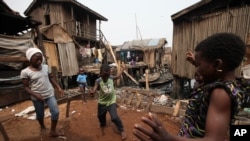GENEVA —
The United Nations is warning the world is not prepared to meet the needs of rapid urbanization. Authors of the World Economic and Social Survey 2013 are calling for bold new strategies to address the overwhelming needs of the more than 6.5-billion people who will be living in cities by 2050.
Most of the new urban dwellers will be in developing countries. The United Nations says the impact on limited resources will be enormous.
The World Economic and Social Survey says ways must be found to meet increasing demands for energy, water, sanitation, as well as public services, education and health.
The world population is expected to rise to more than nine billion by 2050, with two-thirds living in cities. The United Nations says about 80 percent of this burgeoning urban population will be found in Africa and Asia.
The survey says sustainable development of urban areas requires integration and coordination, investments to tackle issues such as land-use, food security, employment creation and transportation.
While urbanization is growing, the survey notes, for the first time in history, the absolute number of rural inhabitants is declining.
Chief of the Development Strategy and Policy analysis Unit, Willem Van Der Geest, says this has far-reaching implications. He says it has implications for how the food systems and economy of rural society will be organized.
“To have large tracts of land uninhabited as we have known in other country contexts is quite debilitating for agricultural and food systems. We need sufficient integration with cities... An integration between the rural and urban economies is absolutely vital for issues of nutrition, food security, and environmental sustainability.”
The survey says sustainable development is key to the eradication of poverty. The report examines the problem of food insecurity, which affects hundreds of millions of people around the world. It notes one in eight people are still chronically undernourished.
Assistant Secretary-General for Economic Development, Shamshad Akhtar, says food production will have to increase 70 percent globally to feed an additional 2.3 billion people by 2050.
“At the same time, we anticipate that demand will continue to shift towards more resource intensive products, such as livestock and dairy, thereby exerting pressure on land, water and bio-diversity sources… There has to be efforts to reduce food wastage. Currently about 32 percent of the food produced globally is wasted. To reduce wastage, changes will have to take place in the food chain-production, storage, transportation and consumption,” said Akhtar.
The survey finds the provision of energy to be among the core elements of the sustainable development agenda, along with food and nutrition security.
The report highlights the U.N. secretary-general’s initiative to end the dependence on traditional biomass as a source of thermal energy. It calls for improving access to reliable, adequate and high-quality electricity.
Most of the new urban dwellers will be in developing countries. The United Nations says the impact on limited resources will be enormous.
The World Economic and Social Survey says ways must be found to meet increasing demands for energy, water, sanitation, as well as public services, education and health.
The world population is expected to rise to more than nine billion by 2050, with two-thirds living in cities. The United Nations says about 80 percent of this burgeoning urban population will be found in Africa and Asia.
The survey says sustainable development of urban areas requires integration and coordination, investments to tackle issues such as land-use, food security, employment creation and transportation.
While urbanization is growing, the survey notes, for the first time in history, the absolute number of rural inhabitants is declining.
Chief of the Development Strategy and Policy analysis Unit, Willem Van Der Geest, says this has far-reaching implications. He says it has implications for how the food systems and economy of rural society will be organized.
“To have large tracts of land uninhabited as we have known in other country contexts is quite debilitating for agricultural and food systems. We need sufficient integration with cities... An integration between the rural and urban economies is absolutely vital for issues of nutrition, food security, and environmental sustainability.”
The survey says sustainable development is key to the eradication of poverty. The report examines the problem of food insecurity, which affects hundreds of millions of people around the world. It notes one in eight people are still chronically undernourished.
Assistant Secretary-General for Economic Development, Shamshad Akhtar, says food production will have to increase 70 percent globally to feed an additional 2.3 billion people by 2050.
“At the same time, we anticipate that demand will continue to shift towards more resource intensive products, such as livestock and dairy, thereby exerting pressure on land, water and bio-diversity sources… There has to be efforts to reduce food wastage. Currently about 32 percent of the food produced globally is wasted. To reduce wastage, changes will have to take place in the food chain-production, storage, transportation and consumption,” said Akhtar.
The survey finds the provision of energy to be among the core elements of the sustainable development agenda, along with food and nutrition security.
The report highlights the U.N. secretary-general’s initiative to end the dependence on traditional biomass as a source of thermal energy. It calls for improving access to reliable, adequate and high-quality electricity.




